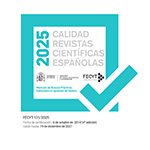El movimiento obrero antes de la guerra civil: el enfoque de Manuel Tuñón de Lara
Abstract
The intention of this work consists of analyzing some of the contributions of professor Manuel Muñón de Lara to the history of the working class in Spain during the chronological stage that is unanimously considered the one of total maturity in terms of labour movement: the first third of the Twentieth Century. His approach derives from three vital factors, which are studied here: Tuñón was both witness and protagonist of part of the history that he analyzes, his work is eccentric front to the Spanish historiography (eccentric geographically, politically, as well as academically speaking) and his main results were the syntheses and not the monographs. In this way, his exhibition of the three levels unfolds: the working conditions of life (class relations), associations (class conscience) and the explicit conflicts (class struggle), preferably strikes.Downloads
Article download
License
In order to support the global exchange of knowledge, the journal Cuadernos de Historia Contemporánea is allowing unrestricted access to its content as from its publication in this electronic edition, and as such it is an open-access journal. The originals published in this journal are the property of the Complutense University of Madrid and any reproduction thereof in full or in part must cite the source. All content is distributed under a Creative Commons Attribution 4.0 use and distribution licence (CC BY 4.0). This circumstance must be expressly stated in these terms where necessary. You can view the summary and the complete legal text of the licence.











